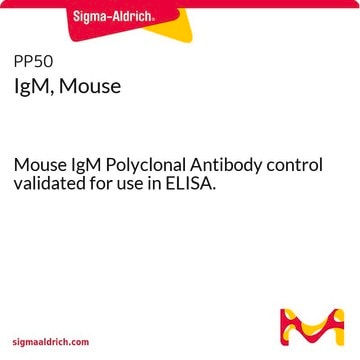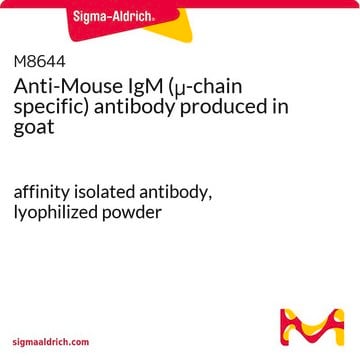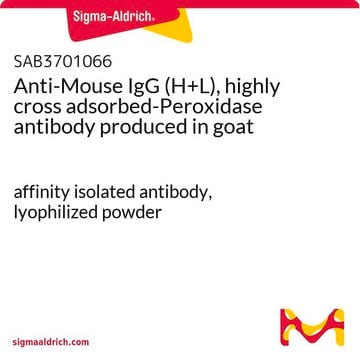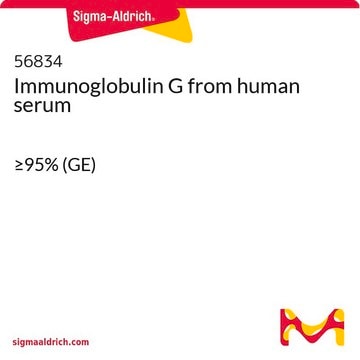MABC008
Mouse IgM Negative Control, clone GC323
Mouse IgM Negative Control Monoclonal Antibody validated for use in Flow Cytometry & Immunofluorescence.
Přihlásitk zobrazení cen stanovených pro organizaci a smluvních cen
About This Item
UNSPSC Code:
12352203
eCl@ss:
32160702
NACRES:
NA.42
Doporučené produkty
biological source
mouse
Quality Level
clone
GC323, monoclonal
manufacturer/tradename
Chemicon®
concentration
0.5 mg/mL
technique(s)
flow cytometry: suitable
immunofluorescence: suitable
isotype
IgM
shipped in
wet ice
target post-translational modification
unmodified
Specificity
This antibody reacts specifically with the outer membrane protein I component of various strains of Neisseria gonorrhoeae and does not react with any human cell surface component.
Immunogen
Protein I preparation of Neisseria gonorrhoeae.
Application
Research Category
Secondary & Control Antibodies
Epitope Tags & General Use
Secondary & Control Antibodies
Epitope Tags & General Use
Research Sub Category
Isotype Control Antibodies
Isotype Control Antibodies
The use of this antibody enables an estimation of non-specific binding of mouse monoclonal antibodies of isotype IgM to cell surface components in human blood and bone marrow. It is not suitable for use in immunohistochemical procedures.
SUGGESTED USAGE
The control antibody should be diluted to the same concentration as the test antibody, and equivalent volumes used. Flow cytometry and immunofluorescence - use 10 μl direct from the vial per 100 μl of whole blood, or 1 x 10E6 peripheral blood mononuclear cells (PBMC) in 100 μl buffer.
SUGGESTED USAGE
The control antibody should be diluted to the same concentration as the test antibody, and equivalent volumes used. Flow cytometry and immunofluorescence - use 10 μl direct from the vial per 100 μl of whole blood, or 1 x 10E6 peripheral blood mononuclear cells (PBMC) in 100 μl buffer.
Physical form
Format: Purified
Purified from mouse ascitic fluid. The antibody is supplied in 0.5ml 25mM Tris HCl, 0.4M NaCl, pH 8.0, containing 0.2% bovine serum albumin and 0.1% sodium azide. The characteristics of each lot are tested by electrophoresis, specific immunofluorescence assay and flow cytometry.
Storage and Stability
Store at 2 to 8°C, for up to 6 months. For prolonged periods, store below -20°C in undiluted aliquots. AVOID REPEATED FREEZE/THAW CYCLES.
WARNING: The monoclonal reagent solution contains 0.1% sodium azide as a preservative. Due to potential hazards arising from the build up of this material in pipes, spent reagent should be disposed of with liberal volumes of water.
WARNING: The monoclonal reagent solution contains 0.1% sodium azide as a preservative. Due to potential hazards arising from the build up of this material in pipes, spent reagent should be disposed of with liberal volumes of water.
Legal Information
CHEMICON is a registered trademark of Merck KGaA, Darmstadt, Germany
Disclaimer
Unless otherwise stated in our catalog or other company documentation accompanying the product(s), our products are intended for research use only and are not to be used for any other purpose, which includes but is not limited to, unauthorized commercial uses, in vitro diagnostic uses, ex vivo or in vivo therapeutic uses or any type of consumption or application to humans or animals.
signalword
Warning
hcodes
pcodes
Hazard Classifications
Met. Corr. 1
Storage Class
8B - Non-combustible corrosive hazardous materials
wgk_germany
WGK 2
flash_point_f
Not applicable
flash_point_c
Not applicable
Osvědčení o analýze (COA)
Vyhledejte osvědčení Osvědčení o analýze (COA) zadáním čísla šarže/dávky těchto produktů. Čísla šarže a dávky lze nalézt na štítku produktu za slovy „Lot“ nebo „Batch“.
Již tento produkt vlastníte?
Dokumenty související s produkty, které jste v minulosti zakoupili, byly za účelem usnadnění shromážděny ve vaší Knihovně dokumentů.
Chih-Jen Lin et al.
PloS one, 9(9), e106916-e106916 (2014-09-12)
The ability of small molecules to maintain self-renewal and to inhibit differentiation of pluripotent stem cells has been well-demonstrated. Two widely used molecules are PD 98059 (PD), an inhibitor of extracellular-signal-regulated kinase 1 (ERK), and SC1 (Pluripotin), which inhibits the
Acceptance of embryonic stem cells by a wide developmental range of mouse tetraploid embryos.
Lin, CJ; Amano, T; Zhang, J; Chen, YE; Tian, XC
Biology of Reproduction null
Mari Kamiya et al.
Nature communications, 13(1), 166-166 (2022-01-12)
Muscle cell death in polymyositis is induced by CD8+ cytotoxic T lymphocytes. We hypothesized that the injured muscle fibers release pro-inflammatory molecules, which would further accelerate CD8+ cytotoxic T lymphocytes-induced muscle injury, and inhibition of the cell death of muscle
Shirley Lam et al.
mAbs, 7(6), 1178-1194 (2015-08-26)
Chikungunya virus (CHIKV) is a medically important human viral pathogen that causes Chikungunya fever accompanied with debilitating and persistent joint pain. Host-elicited or passively-transferred monoclonal antibodies (mAb) are essential mediators of CHIKV clearance. Therefore, this study aimed to generate and
Náš tým vědeckých pracovníků má zkušenosti ve všech oblastech výzkumu, včetně přírodních věd, materiálových věd, chemické syntézy, chromatografie, analytiky a mnoha dalších..
Obraťte se na technický servis.







